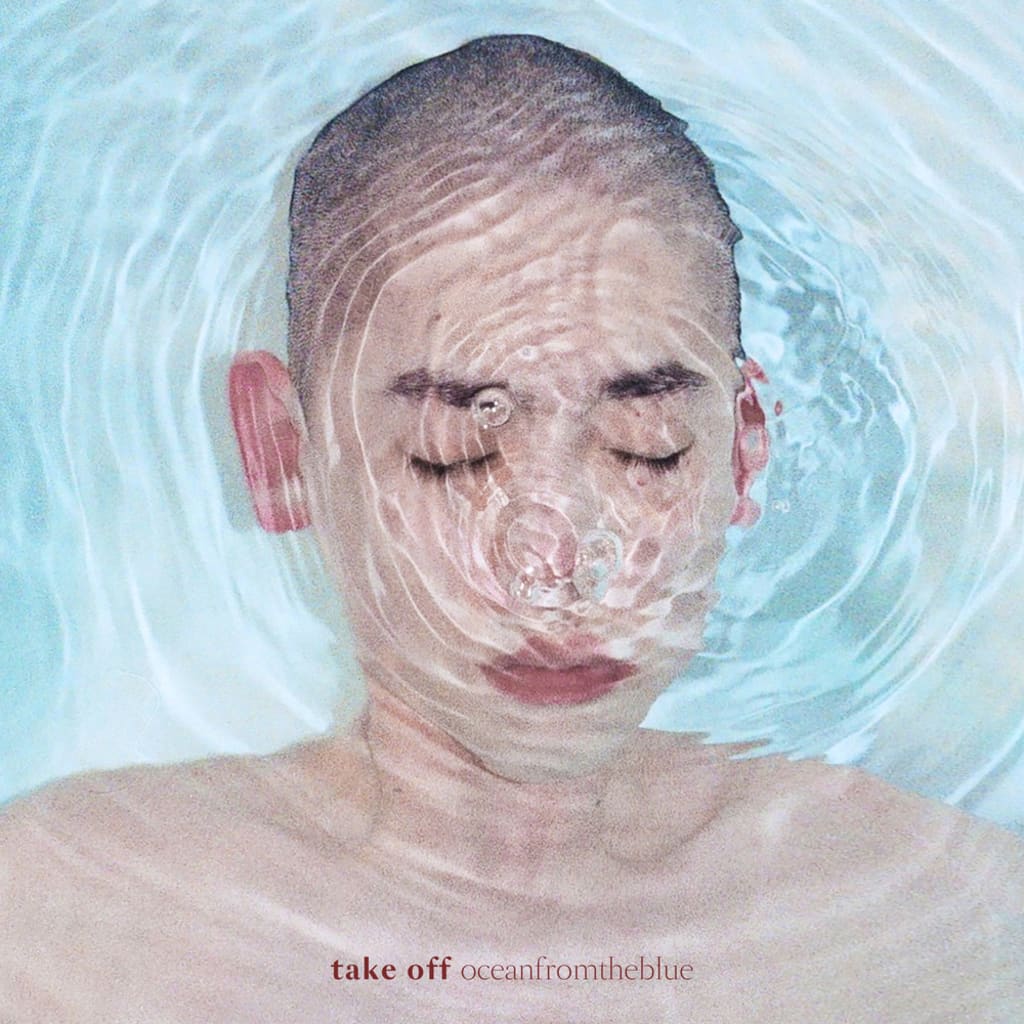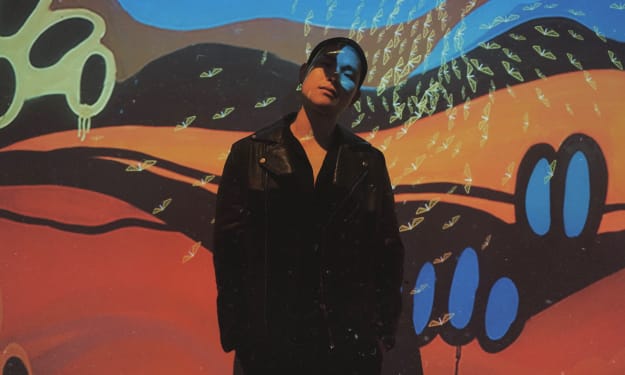oceanfromtheblue Interview: The R&B Artist Discusses the Meaning Behind ‘take off’, His Style and More
oceanfromtheblue’s new EP ‘take off’ is available now.

Just two weeks ago, oceanfromtheblue released take off. A departure from his usual, often love song-leaning stylings, this six-track offering documents the 28-year-old’s depression in a candid, no-punches-pulled manner. Centred around bidding farewell to his dark, melancholy mindset and welcoming in a more mature, positive version of himself, the EP sees the R&B artist weaves his powerful vocals alongside emotional sonics and unwavering melodies.
Perhaps most poignantly though, all intentions and meanings manifest most touchingly on “idol.” Bolstered by a tangible chemistry between himself and featured artist Snacky Chan, the 28-year-old breezes through the song with his breathy, harmonious vocals, flanked by simplistic percussion and an affecting melodic backdrop. Similarly, lead-single “mistaken,” an offering which deviates more towards a hip-hop production style with a looped sample and drum beats, showcases oceanfromtheblue’s sonic versatility. Fast-paced and lyrically frank, it’s a strong showing on an unwavering release, and one that helps shine a light on why the artist is starting to climb his way to the upper-rungs of the industry.
Fortunately, during this important chapter of his career, we managed to speak to oceanfromtheblue about the meanings behind his new release, writing style and much more.
Nathan Sartain: Firstly, how do you feel about your new EP, take off?
oceanfromtheblue: I’m an R’n’B musician, who usually sings love songs a lot, but Take Off is all about my life.
I’m 28 and I don’t have as much life experience as my parents or other elders but I did my best to express my feelings that I have had in my life. Strangely enough, I didn’t plan to make this album. I had been feeling quite down for six months, and the tunes I’d made over the period turned out to have an organic composition like an album. So I gathered up the tracks and when I heard them, I was like, “Wow, this is an album.” That’s how I put the songs together as an EP. To put it simply, this EP is my depression itself.
To expand on something, you chose to talk beforehand about the fact that it’s an EP without love songs, so how did you go about creating something purely about your life?
I wrote down my thoughts and tough situations in a straightforward way. I put a lot of effort to make it lyrical because textbook-like lyrics wouldn’t be impressive or touching. There is this story from anguish through climax to acceptance. Rather than solving the issues, it just embraces it, which is just like my case.
Similarly, what was the overall recording and writing process like for this release?
I did the producing and recording all by myself. Although I belong to a company now, I wasn’t back then. I signed a contraction later and I got a lot of help with design, image and stuff.
What do you think fans can most anticipate on this release?
There is this famous saying: “What is most personal is the most universal.” After I finished recording, I listened to it from the beginning to the end and I thought that although this is my story, it has many aspects that other people can relate to. The moment I was born, I haven’t had any striking appearance or talent. I think about it quite often, and I think I’m not the only one who does that. We all have felt unsatisfied with ourselves at least once. Hopefully they can relate to this EP and be comforted.
Before we move on, is there anything else you’d like to add about take off?
So many thoughts run through my head. I don’t think I can write all of them down.
It’s your third E.P. of 2020. Although some of the songs had been heard before, what has been the key to your effective and quick releases?
I believe that when you stop expressing yourself, you’re dead. It’s normal to say that you’re sad or happy when you are. Some people just let it out explicitly but we all have our own ways to relieve their emotions. For me, that’s music and lyrics. My days, my past, happy memories, sad memories… all these things are saved in my mind, waiting to become the source of music. Whether I’m walking down the street alone or talking with people, I always think to myself a lot. Those thoughts burst out when I try to write down what I want to say. I think that’s why I can write many songs quickly.
I don’t really push myself to speed up, though. The moment it becomes a “job,” I face a dilemma.
As an additional comment, what has been your thinking behind releasing numerous EPs as opposed to say a more traditional LP album?
I guess it’s not like one thing is better than the other. It’s just up to you, or the situation. In my case, when I was an amateur, releasing through SoundCloud, I had made and released too many tracks and I wanted to slow down. But after I signed a contract, I needed to keep up with the strategies and schedules. I can’t think only about myself anymore. So I happened to release many EPs and I don’t think it’s good or bad. It depends on the circumstances.
Stylistically, as you often don’t shy away from covering topics such as mental health, is it important for you to be able to use your music as a tool to talk about any subject matter you wish?
I think it’s about being persuasive. If a touchy-feely person cries and says, “I’m sad,” you really can tell and feel the person is sad. But I usually keep a straight face and if I say that I’m sad, sometimes people think it’s a lie. So I make a really sad song to express why and how sad I am. A sad song delivers the message and the audience may feel, “Wow, this guy is really sad.” After all, it helps me and my feelings (be) much more persuasive and I think that’s a very powerful weapon.
Your music has a heavy aesthetic side to it too. How beneficial is it for you that you can use fashion and images to aid the music?
I say this a lot to my friends who are younger than me: “Don’t ever take what you see lightly.” We have the five senses. Even if it’s a super good track, just the auditory sense is not enough to be fully satisfied. The first thing we encounter while we search something is a visual image, not a sound. I believe that the cover art is what intrigues you in the most intuitive way - actually, many people try to listen to the music because of cool cover arts - then, the outward aspects and the story about the artist are what matter. When those things click together, the music becomes even more persuasive. Like the first impression. What I’m trying to say is that the sound is not everything but all the other elements are just as important.
Furthermore, as an independent artist, do you think that gives you a little more freedom as to what you can do and express with your songs?
It has upsides and downsides. One good thing is that I can write whatever I want. I can swear or be dirty. No one bothers or even cares. But since I’m doing it alone, it’s true that I can’t take care of all the details. And when the music is released, I get less support and attention. I used to make a lot of agreeable music to attract as many listeners as possible. When you worry about how the audiences will take it, you don’t have much freedom.
What are your intentions for potentially new listeners in regards to your music?
My back catalogue is growing. I’d be very happy if people can ever feel sympathy and comfort from one of them.
These days, how are you managing to stay creative?
I try to keep it frank. To do that, I need a lot of life experience. So I try hard to experience something. For example, I never drink but still, I like to be there. When people are drunk, they start to talk about themselves seriously. That inspires me a lot when I’m at my studio.
And goals wise, has anything changed for what you want to achieve by the end of 2020?
Actually, I had many plans for gigs not just albums but everything was cancelled due to COVID-19. So my wish for the year of 2020 is the end of COVID-19.
Before we finish, what can people expect from you as continue on your path?
I don’t have any grand goal or ambition. When people listen, love, and empathize with my music, that just means so much to me. I want to be with them for a long long time.
And finally, is there anything else you’d like to say?
Oceanfromtheblue as a musician only exists because of the fans. I thank them so much that they have made someone so ordinary so special. I want to stay as who I am, singing about my and their stories. To my fans, I thank you and love you so much!
oceanfromtheblue’s new EP, ‘take off’, is available now.






Comments
There are no comments for this story
Be the first to respond and start the conversation.